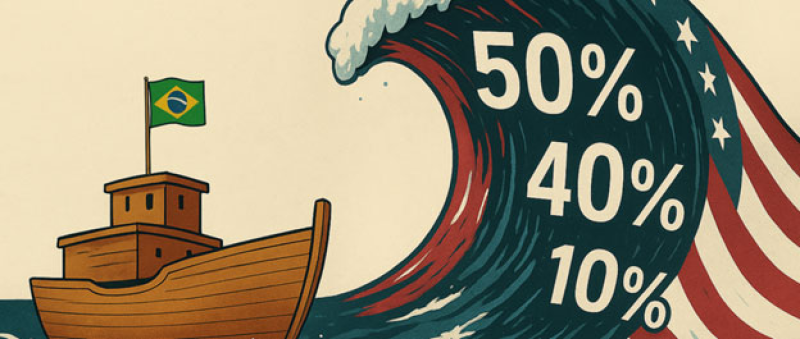- UN Rights Office Warns of Gaza Escalation, West Bank Annexation |
- UN Warns Wildfires and Climate Change Worsen Air Quality |
- OIC Hails Belgian Declaration of Intent to Recognize Palestinian State |
- Bomb blast kills 15 near political rally in Pakistan |
- Corruption Persists Despite Uprising, TI Chairman Warns |
Trump’s Tariff Wave Strains Brazil-US Trade Relations

Brazil is pursuing partners across the globe, turning pressure into opportunity. Could Europe play a pivotal role?.
Since January 2025, Donald Trump’s second presidency has focused on securing the global supremacy of the United States. It has justified a package of international coercive and intimidatory measures, accompanied by aggressive and arrogant rhetoric. Right at the outset, the new administration announced a veritable tsunami of tariffs and immediately implemented them as a sign of its newfound independence.
This demonstrated Washington’s willingness to turn access to the US market into a challenge fraught with uncertainty and prolonged bilateral negotiations. This massive blow to the global trading system affects all of the United States’ economic relations, including those with Brazil.
In addition to a general 10 per cent increase in all US import tariffs, a differential treatment policy for countries and regions was introduced based on varying and sometimes opaque criteria. The US President interprets the need to combat the American trade deficit as a national emergency, justifying the imposition of counter-tariffs.
By August, 94 countries were already affected by this contentious policy. Some, including Vietnam, South Korea, the United Kingdom, and the European Union, managed to reach tariff agreements, but often at the cost of various concessions and significant losses.
In the first few months of Trump’s term, Brazil kept a safe distance from Washington’s coercive measures. The Lula government continued its active and self-confident foreign policy.
Brasília’s influence, particularly in global governance, was bolstered by its role as host of high-level multilateral meetings this year, including the G20 summit, the BRICS heads of state meeting, and the upcoming COP30 climate conference.
Relations with China, Brazil’s most important trading partner accounting for 28 per cent of its foreign trade, also gained new significance, with 36 agreements signed across economic, technological, and cultural sectors.
While the Lula administration sought dialogue with the White House to address the potential damage of the new US tariff policy—as the US accounts for 12 per cent of Brazilian exports—it was only a matter of time before the US administration’s aggressive stance would impact Brazil’s economy.
On 18 July, the American government informed President Lula da Silva that tariffs of 50 per cent would be levied on Brazilian imports, initiating a heated exchange with the Planalto, the seat of the Brazilian presidency. By executive order, Trump imposed an additional 40 per cent tariff on Brazilian imports, supplemented by a list of 700 exceptions.
The justification for increasing tariffs to offset the bilateral trade deficit proved unfounded, as the trade balance has consistently shown a surplus in favour of the United States for more than 15 years.
Additionally, the American president’s letter addressed political issues, including court proceedings against former President Bolsonaro and rulings of the Brazilian Supreme Federal Court (STF), affecting US digital platform companies’ interests. Lula’s government perceived the letter as “unacceptable blackmail,” which heightened tensions due to repeated public statements by the US president and his staff.
This was followed by an investigation by the Office of the United States Trade Representative (USTR) based on Section 301, allowing unilateral retaliatory measures to protect national interests. The Trump administration also began questioning competitive conditions for North American companies in Brazil, attacking the PIX instant payment system, and criticising Brazil’s environmental and anti-corruption policies, digital platform handling, and preferential trade agreements with third countries.
Right-wing circles seized the opportunity to blame Lula for the escalation with Washington. Ideologically motivated campaigns were further fuelled by connections between Trumpism and Bolsonarism. Digital media channels amplified criticism of Brazil’s judiciary and institutions, creating fault lines in Brazilian politics and affecting industries economically.
The timing of Trump’s tariff shock, coinciding with the court ruling against former President Bolsonaro for his role in the 2023 coup attempt, intensified tensions. The Magnitsky Act was used to sanction STF judges and portray Bolsonaro as a human rights victim in the eyes of Trumpists.
Washington rejected the World Trade Organization’s dispute settlement mechanisms, citing security policy arguments, while Trump’s criticism of Brazil’s international policy became increasingly vocal. The political steadfastness and economic acumen of Lula’s foreign policy face serious short- to medium-term challenges.
The Brazilian government seeks partners globally. Engagement with Japan, Indonesia, and Vietnam aims to strengthen ties with China and integrate Brazil into dynamic Asian value chains. Dialogue with India, a key BRICS partner, focuses on global governance, investment, agribusiness, and digital technologies. Brazil also aims to improve regional relations with Mexico.
Closer cooperation with European countries is another priority, including concluding the long-delayed EU-Mercosur agreement to expand opportunities in energy transition, technology, and multilateralism. Such alliances are seen as safeguards for Brazil’s rule of law.
Europe remains sceptical of BRICS and the Global South, often interpreting their positions as anti-Western, a view shared by Trump. Brazil’s efforts to engage emerging powers aim to address global crises, including the situation in Gaza, Iran, and Russia-Ukraine peace initiatives.
Although strategic dependence on the US remains, these partnerships enable inclusive and constructive engagement on the evolving world stage. The Lula government continues to support this diplomatic direction, viewing cooperation with global democracies as vital to defending Brazil’s sovereignty and democracy.

